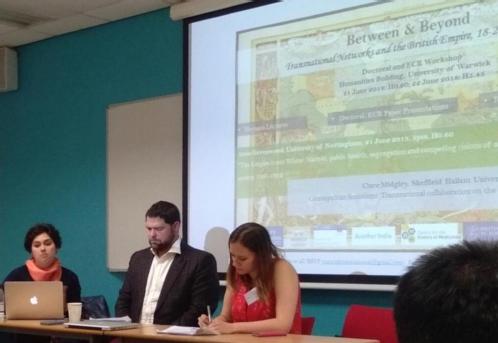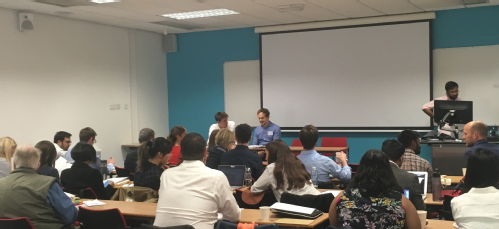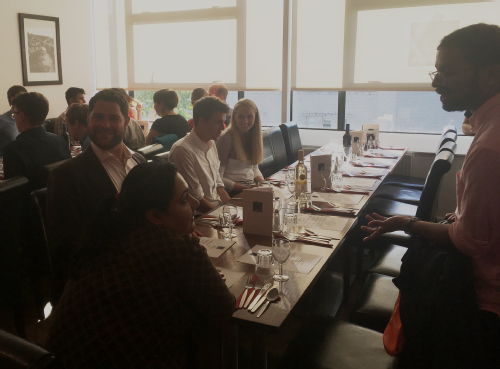History News
Professor Rebecca Earle in conversation with Ruby Tandoh


Ruby Tandoh is an author and journalist who’s written for the Observer, Vice and Elle. She’s currently a columnist for the Guardian’s Feast supplement and was a finalist on the 2013 Great British Bake Off. She has published two cookery books, Crumb and Flavour.
Ruby will be at the Talisman Theatre, Kenilworth, at 8pm on the 20th September 2018 (details available online) to talk about her latest book, Eat Up! – a ‘joyous manifesto for flavour and sanity’, which explores everything from gluttons and gourmets in the movies, to the symbolism of food and sex. which was published in February 2018 and was a Sunday Times best-seller.
Ruby will be speaking in conversation with acclaimed food historian Professor Rebecca Earle of the Warwick University History Department.
The Emotional Politics of the Alternative Left: West Germany, 1968-1984
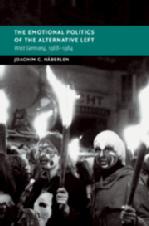
The Emotional Politics of the Alternative Left: West Germany, 1968-1984 is a new book by Dr Joachim Häberlen of the Warwick University History Department, published by Cambridge University Press.
In the 1970s, a multifaceted alternative scene developed in West Germany. At the core of this leftist scene was a struggle for feelings in a capitalist world that seemed to be devoid of any emotions. Joachim C. Häberlen offers here a vivid account of these emotional politics. The book discusses critiques of rationality and celebrations of insanity as an alternative. It explores why capitalism made people feel afraid and modern cities made people feel lonely. Readers are taken to consciousness raising groups, nude swimming at alternative vacation camps, and into the squatted houses of the early 1980s. Häberlen draws on a kaleidoscope of different voices to explore how West Germans became more concerned with their selves, their feelings, and their bodies. By investigating how leftists tried to transform themselves through emotional practices, Häberlen gives us a fresh perspective on a fascinating aspect of West German history.
Details of all the monographs and edited collection of the Warwick University History Department's academic staff are available online.
The Ghost of Namamugi: Charles Lenox Richardson and the Anglo-Satsuma War
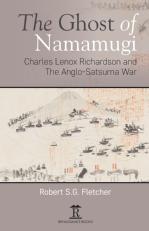
The Ghost of Namamugi is a new book by Dr Robert Fletcher, Associate Professor of Britain and Empire at the University of Warwick, to be published later this year by Renaissance Books.
In 1862, a young British merchant was killed by samurai, in uncertain circumstances, at Namamugi – a quiet village near Yokohama, Japan. One year later, a British fleet bombarded the port of Kagoshima to extract reparations, reducing much of this south-western city to ash.
The Ghost of Namamugi is a captivating re-telling of this story, locating it firmly within the wider context of British imperial expansion in East Asia. Dr Fletcher explains how it was that the death of one man led to the partial destruction of a city, and approaches this murder as a window onto the makings and dynamics of a mid-nineteenth century ‘outrage’. The book explores how competing images of the dead of Namamugi, Charles Lenox Richardson – to some a martyr in the cause of free trade, to others the embodiment of a bullying merchant class – have served to justify and to lament Britain’s bombardment ever since.
Making use of newly discovered sources, The Ghost of Namamugi also presents, for the first time and in full, Richardson’s personal correspondence home. Written across ten years spent living and trading at Shanghai, the Richardson letters to give readers a chance to form their own judgement of the man at the centre of an international incident. Together, the book offers new perspectives on the thoughts, experiences and travails of a determined young merchant of the treaty port world, at a critical moment in the history of imperial expansion and conflict in Asia.
Details of all the monographs and edited collection of the Warwick University History Department's academic staff are available online.
British Academy Postdoctoral Fellowship Scheme 2018
The Department of History encourages outstanding postdoctoral scholars to apply to the British Academy Postdoctoral Fellowship scheme, for Fellowships hosted at Warwick starting in the 2019/20 academic year.
Applications are welcomed from candidates who have a strong research profile and meet the following eligibility criteria:
- They must be in possession of a doctoral degree by 1st April 2019
- They must be either a UK/EEA national, have completed their doctorate at a UK university or have a strong prior association with the UK academic community
- They must not yet have held a permanent academic appointment
- They must be within three years of the award of their doctorate (measured from the date of their viva voce examination) on 1st April 2019.
Appointments at the University of Warwick are dependent on the award of the Fellowship. The expectation is that Fellows should undertake a significant piece of publishable work during the funded period. For more information on the scheme’s aims and eligibility criteria, please visit www.britac.ac.uk/british-academy-postdoctoral-fellowships.
Prospective applicants are required to identify an academic mentor from within the Department of History. Applicants should approach their proposed mentor to discuss their project at the earliest opportunity.
Applications will require approval from the Department of History before submission to the British Academy. For the Department of History to determine which candidates go forward to the British Academy, candidates will need to send the following information by email to both James Green, Research Strategy and Development Manager for the Faculty of Arts (James.Green@warwick.ac.uk) and to Professor Giorgio Riello, Department of History Director of Research, (G.Riello@warwick.ac.uk) by 5pm on Friday 21st September 2018:
- A short description of their proposed project (maximum 2 A4 pages)
- A copy of their CV (maximum 2 A4 pages)
- The name of their proposed mentor at the University of Warwick
- The name of their referee
- How their research plans fit with the profile of the Department/School/Centre they wish to be hosted by (maximum 150 words)
If their application is approved, candidates will be invited to submit their proposal through Flexi-Grant, the British Academy’s application portal. The deadline for these submissions is Wednesday 17th October 2018.
The University is able to support approved candidates in the development of applications through our Research and Impact Services team. For more information about this and for any other enquiries about the scheme, please contact James Green (James.Green@warwick.ac.uk) on the above email address.
'The Ties That Bind: Siblings, Family and Society in Early Modern England' by Emeritus Professor Bernard Capp
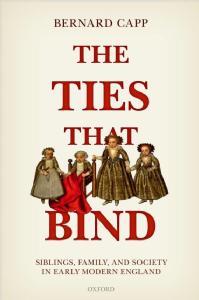
The Ties That Bind: Siblings, Family and Society in Early Modern England is a new monograph by Emeritus Professor Bernard Capp, published by OUP Oxford in 2018.
The family is a major area of scholarly research and public debate. Many studies have explored the English family in the sixteenth and seventeenth centuries, focusing on husbands and wives, parents and children. The Ties that Bind explores in depth the other key dimension: the place of brothers and sisters in family life, and in society.
Moralists urged mutual love and support between siblings, but recognized that sibling rivalry was a common and potent force. The widespread practice of primogeniture made England distinctive. The eldest son inherited most of the estate and with it, a moral obligation to advance the welfare of his brothers and sisters. The Ties that Bind explores how this operated in practice, and shows how the resentment of younger brothers and sisters made sibling relationships a heated issue in this period, in family life, in print, and also on the stage.
Details of all the monographs and edited collection of the Warwick University History Department's academic staff are available online.
Professor Hilary Marland shortlisted for AHRC's Health Humanities Medal
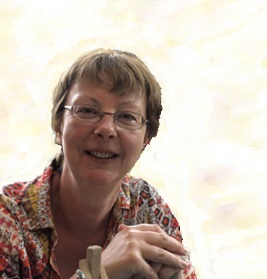
Professor Hilary Marland of the Warwick University History Department has been shortlisted for AHRC's Health Humanities Medal, a new national award led by the Arts and Humanities Research Council in association with the Wellcome Trust.
Professor Marland is one of five academics who has made the shortlist for the Leadership Award category, which recognises those who have demonstrated leadership within the field of health humanities. The Health Humanities Medal comprises five categories designed to celebrate the achievements of those who have helped to inform and transform the health and wellbeing of the nation through the use of arts and humanities research.
Commenting on the shortlisting Professor Marland, said: “This is a huge honour and I am delighted to have been short-listed for the Medal. Health humanities is an exciting field to work in and offers enormous scope to academics to combine research with public engagement.
"Working with my colleagues at Warwick, most recently on a Wellcome Trust funded project on health in prison, I have had the opportunity and support to engage in initiatives that draw on historical research to develop new ways of working with the arts, policy makers and a wide range of audiences.”
Douglass Adair Memorial Award 2018: Professor Rebecca Earle
Professor Rebecca Earle has been awarded the William and Mary Quarterly Douglass Adair Memorial Award 2018 for her article, The Pleasures of Taxonomy: Casta Paintings, Classification, and Colonialism, which also won the William and Mary Quarterly Lester J Cappon Award 2016.
Between and Beyond: Transnational Networks and the British Empire, 18th-20th Centuries
The doctoral and early career academic workshop, Between and Beyond: Transnational Networks and the British Empire, 18th-20th Centuries, was held on 21-22 June 2018. The workshop was a great success, with many great papers presented and lively conversations held.
